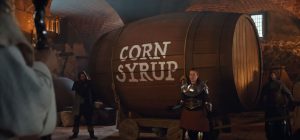- What Will the New American Revolution of Limiting the Power of the Regulatory State Mean for Businesses?
- What Will the New American Revolution of Limiting the Power of the Regulatory State Mean for Businesses?
- The Copyright Office Issues Its Long-Awaited Report on AI Training Material and Fair Use. Will It Stymie the U.S. AI Industry?
- What Risk Does Your Business Face for Creating Social Media Posts in the Studio Ghibli Style?
- Going From March Madness to Trademarks Madness
Latest Blog Posts
Liability for False Advertising: Kings, Corn Syrup, Beer, and Half-Truths
Posted May 21, 2019
I love the scene in the movie The Pink Panther Strikes Again where Inspector Clouseau is checking into a small inn. At the front desk, Clouseau notices a dog lying on the floor. He asks the innkeeper, “Does your dog bite?” “No,” responds the innkeeper.
Clouseau bends down to pat the dog on the head and gets bitten. Stunned, Clouseau confronts the innkeeper – “I thought you said your dog does not bite!” Insouciantly, the innkeeper intones, “That’s not my dog.”
Technically true but deceptive – it’s good movie humor, but is it legal in advertising? Anheuser-Busch has millions riding on the answer.
You’ve probably seen the Anheuser-Busch commercials in which the Bud Light King proudly proclaims no corn syrup is used in brewing his kingdom’s beer, whereas rivals Coors Light and Miller Lite brew with it. Anheuser-Busch spent almost $50 million running ads featuring the Bud Light King just during the 2019 Super Bowl.
Is the Bud Light King telling the truth?
Technically, he is, but viewers might get the wrong impression. For that reason, MillerCoors, the maker of Coors Light and Miller Lite, is suing Anheuser-Busch for false advertising.
MillerCoors contends the ads give the false impression its beers contain corn syrup. That sounds yucky and cheap. As it turns out, MillerCoors uses corn syrup in brewing its beers, but the corn syrup is burned up in the process. It’s not in the finished beer.
I don’t know which side will win the lawsuit, but let’s use the occasion to survey false advertising law, to help your business steer away from expensive legal wars.
Under the federal Lanham Act, a company can obtain an injunction stopping false advertisements by competitors and sometimes can recover damages and attorneys’ fees. Various kinds of false ads are illegal, such as ones concerning attributes of the advertiser’s products, ones about competing products, and ones making product comparisons.
The act makes it fairly easy for competitors to get injunctions stopping false ads.
If a competitor proves an ad targeting its product is literally false, or if it proves the ad, while not literally false, can be interpreted only in a way that’s false, the court will presume the falsity hurts the competitor and issue an injunction stopping the ad.
On the other hand, if a claim is literally true or ambiguous, a plaintiff must prove consumers will interpret it in a way that’s false. That usually is done with a consumer survey.
If the advertiser has no research backing up its claims, a court will presume they are false. If the advertiser did testing to make its claims, a competitor can stop the ad by showing the test wasn’t reliable or didn’t produce the claimed results. If an advertiser claims its product is better than a competitor’s in a measurable way, the competitor can stop the ad by showing it isn’t.
Yet, the law doesn’t ban mere puffery, such as a bare claim that a product is best. The law concerns only material, specific claims that are measurable by research. That’s why many advertisers avoid claiming product superiority in a measurable way.
While it would be gratifying to smite your lying competitor in court, if your company is the victim of a false ad, consider whether it would be worth the legal fees.
The Lanham Act permits a court to award recovery of attorneys’ fees to the winner only in “exceptional” cases. Courts rarely award them.
To get damages, you must show the defendant’s false ads directly caused your lost profits. That’s hard to do.
So, how will the Bud Light King fair in this legal joust?
The corn-syrup ads are literally true – MillerCoors admits Coors Light and Miller Lite are brewed with corn syrup. The question is how consumers interpret the ads. Did they cause consumers to think the targeted beers contain corn syrup? That’s a tough call.
If the case doesn’t settle, it will come down to which side produces the more compelling survey evidence of how consumers interpret the ad. That’s something highly paid expert witnesses will duel over. However it comes out, the lawyers will charge a king’s ransom to fight the battle.
Written on May 21, 2019
by John B. Farmer
© 2019 Leading-Edge Law Group, PLC. All rights reserved.




